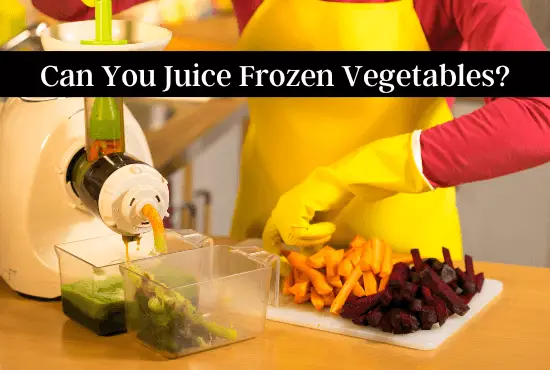Drinking fresh vegetable juice is, unquestionably, a healthy habit that can promote wellness. But, there are a few doubts about using frozen veggies for the same purpose.
What if they are not as healthy and nutritious as the fresher ones? And, you might wonder if it is possible to juice frozen vegetables in the first place or not.
You can juice frozen vegetables as they possess many healthy nutrients. Always thaw them first before extracting the juice, as you do with fresh vegetables. Frozen produce can yield more quantity of liquid as they are in a mushier state after defrosting. However, there can be a loss of flavor and nutrition. Still, they are good to go in different juicing recipes.
It’s easier to predict that fresh vegetables are suitable for juicing. What if you crave a veggie drink out of season and hard to find? It can be satisfactory to say, in such a situation, that frozen vegetables can replace them. If you wonder how even, let’s find out!
Table of Contents
Is It Okay To Juice Frozen Vegetables; Why Or Why Not?
Vegetables are an essential part of a balanced diet. It is why many people try not to skip them at any cost. While eating them raw can sometimes feel bland and repetitive, one great alternative that is recently gaining popularity is juicing your favorite veggies.
You’ll be happy to know that, just like fresh vegetables, frozen vegetables are equally effective for juicing. And, you can create excellent recipes with them. You can have more choices with them because you don’t need to stick with the seasonal veggies only.
You can store your frozen vegetables for an extended period and utilize them whenever you feel the urge. Moreover, they turn mushier after freezing and thawing, making them ideal for juicing because they provide a higher juice yield.
However, one downside of juicing frozen veggies is that they tend to lose some percentage of their nutrients. Thus, they are less healthy than their fresh counterparts. Also, they might taste a little different, so if you are okay with this, you can go ahead and juice them.
How To Effectively Juice Frozen Vegetables?
To extract the maximum amount of juice from frosted veggies, follow the steps listed below.
1. Thaw them first
The first step for juicing frozen vegetables is to thaw the ingredients first. If you put them all straight into the juicer, it can cause the blades to become blunt, and your juicer might not work well. Thus, to get a higher juicer quantity from the product, you must allow it to thaw completely.
You can achieve this goal by either leaving them out overnight or running them under cold water for about thirty minutes. However, you must know that the later technique might wash away some of the nutritional value of the veggies.
2. Make puree before tossing veggies into the juicer
One way to get more juice from your frozen vegetable is to puree them before juicing. Just transfer the thawed ingredients to a blender/ food processor and set the machine on a high setting until a puree forms with a smooth consistency. Depending on your processor, the process can take around 1 to 2 minutes.
3. Avoid peeling every produce
While some people prefer peeling vegetables before turning them into juice, it is not always a good idea. Few veggies, such as cucumber, and beetroots, have plenty of nutrients present in their skin. So, ensure to consider this before peeling off every food item unknowingly.
4. Cut them into reasonable pieces
You need to cut the thawed vegetables into reasonable sizes to slide them inside the juicer. To be specific, try to chop them around to one or three cm, and this way, you will be able to squeeze out more juice from the produce.
5. Extract by the wringing method
You can extract even more juice by applying the wringing method. All you need to do is take out the juice from the veggies in a juicer with pulp, blend them until smooth, plus run them through a strainer lined with a juice cloth, with a bowl placed underneath for catching all the liquid. Now twist the cheesecloth and squeeze it well to extract the maximum juice, and only dry pulp remain behind.
Is Juicing Frozen Vegetables Healthy Enough?
You might wonder if juicing frozen vegetable is worth all the efforts, and the answer is yes. Experts say it is good to incorporate frozen veggie juice into your diet, as it is healthy and normal to consume. However, if you compare it side by side with fresh vegetables, the latter is always the priority.
You will get up to 95% of nutrients and vitamins when you juice veggies while they are fresh. On the other hand, frozen vegetables show a significant decline in their nutritional value.
However, it doesn’t mean that they are not healthy at all. They are still a great addition to your daily intake routine. And, you will notice many positive developments in your health.
Frozen Vegetable Juice Recipes
1. Frozen cucumber lemonade
This recipe is super hydrating and perfect for summertime when you feel exhausted and low on energy. Kill the heat by following this simple and easy-to-make veggie drink.
- One large size cucumber(frozen)
- Mint leaves
- Three/four lemons or lime
- Ginger (optional)
- Water (as required)
- Rinse and chop the cucumber and transfer them to the juicer/blender
- Add as much water as you’d like to dilute it to the consistency of a lemonade.
- Blend the ingredients and then strain them out on a juicing container to remove all the unwanted elements.
- Lastly, add some sugar if you like for some sweetening, and your refreshing drink is ready!
2. Beetroot mint juice
As we all know that beetroot is a rich source of fiber, folate, manganese, iron, and vitamin C. They are associated with many health benefits, and thus, this recipe is perfect for improving your body performance.
- One beetroot
- Mint leaves
- One-inch ginger
- Two tablespoons of lemon juice
- Two tablespoon honey
- Water (chilled)
- Salt to taste
- Ice cubes as per requirement
- Dice the thawed beetroot into small chunks to fit them with ease inside the juicer. Then, pour in some water so that it blends smoothly. you can also add ginger at this stage, but it is optional
- Strain the juice to separate all the pulp from the liquid. Next, place some ice cubes in a glass and transfer the beetroot juice into it.
- Add in the lemon juice and honey for some hint of sweetness. Garnish it with mint leaves, and you are ready to take a sip.
What Are The Benefits Of Juicing Frozen Vegetables?
One of the main advantages of juicing frozen vegetables is you tend to get your favorite veggie without waiting for its season. If you want carrot juice in summer or spinach drink during the rainy season, you can get them anytime. Because they are already in a frozen state, you can store them for as long as you prefer.
Another cool thing about juicing frozen veggies is that you can extract more juice from them than fresh vegetables. When you keep them for several days inside the freezer, crystallization occurs, which means the thawing will lead to a much mushier veggie. Thus, the water content of frozen produce is a lot more than fresh vegetables, and you’ll end up with a higher juice quantity.
Conclusion
Juicing frozen vegetables is something you can try. But, it can be a little tricky. They tend to become mushy after freezing and thawing. So, it can be tough to handle them and toss your favorite food inside a juicer. Nevertheless, you can get a higher quantity of juice from frozen veggies than from their fresh counterparts.
With frozen veggies, you don’t have to wait all year for the perfect season to enjoy your favorite juice. However, it is crucial to thaw the vegetable before juicing them, as when they are in a frozen state, they might damage your juice and cannot get juiced well. When you follow the proper steps highlighted in this article, you will get a dose of nutrients and vitamins from your frozen vegetables.



